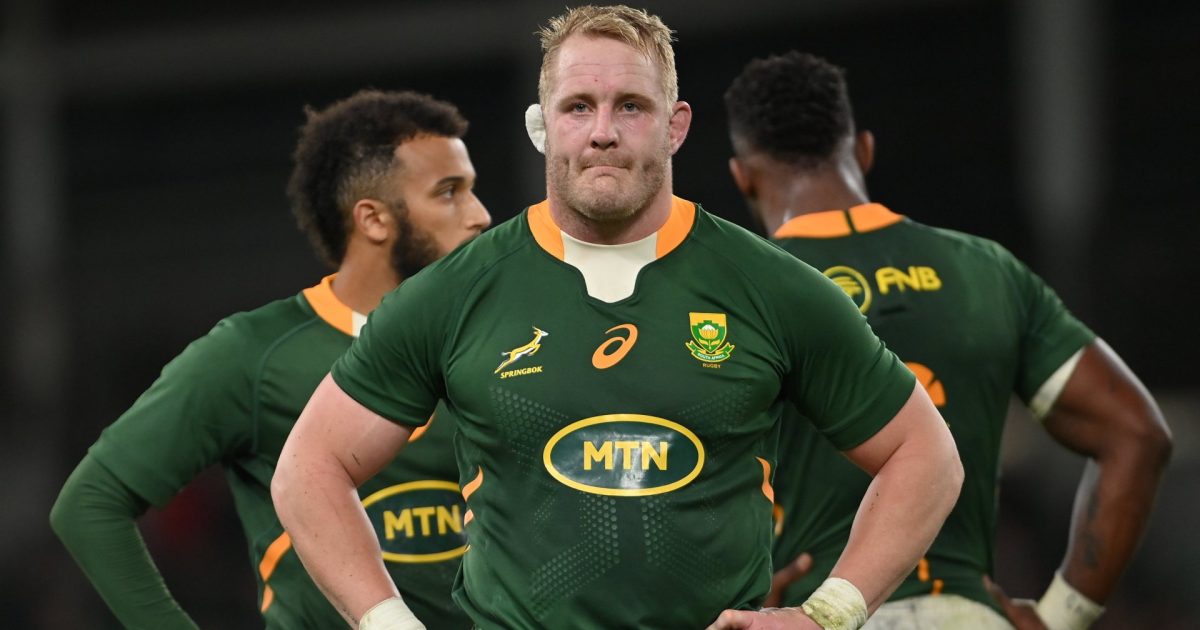Vincent Koch opens up on Wasps redundancy and his switch to France

After the financial meltdown of Wasps, most of the players at the club have managed to rebound and find new homes, some even shining in the Top 14 a few days later. Life might be different than in Coventry as they settle into their new surroundings, but players like Springboks tighthead Vincent Koch and Burger Odendaal, his fellow South African, are finding their feet again after a difficult time.
Koch ran out for South Africa against Italy in Genoa on November 19. The next day he was on a plane back to his homeland to finalise his visa for France having bagged a contract with Stade Francais. No time was lost as the prop touched down in Paris to make his Top 14 debut three days later in a narrow defeat by Toulon.
It was a true baptism of fire for the South African after just a handful of training sessions and being unable to converse in the language of Moliere. “I could just say ‘hello’ pretty much,” Koch admitted to AFP.
“Everything came so quick,” he added about the way Wasps were put into administration in mid-October. “When you start playing professional rugby, you never think that is something that could ever happen to you.”
After six seasons at Saracens, the 32-year-old front-row was laid off by Wasps without having even played a single game in the colours of his new club. “It put a lot of pressure on myself, on my family,” continued Koch. “I had two weeks to try to sort things out before I joined up with the Springboks.
10-and-half weeks after the collapsed Wasps last played in the Premiership, @heagneyl ??? investigated what had since happened to the 23 players who lost to Northampton on October 9 at the CBS Arena. #GallagherPrem #ICYMIhttps://t.co/rzlqk8fKrv
— RugbyPass (@RugbyPass) December 29, 2022
“In that two weeks, I had to look for a new contract, try to figure out what the future held for me and then as well move everything from my house because I couldn’t stay there. I had to get someone to move my house, stop all my debit orders, TV, the wifi. Trying to get out of my housing lease as well.”
Jack Willis had spent his entire professional career at Wasps until the call came on October 17 for a meeting at the training ground. “We were just expecting to be told that we were going into administration,” said Willis. “We weren’t expecting to be told that we were all losing our jobs.
“When we were told we were made redundant, the room just went into complete silence and everyone was shocked. There were quite a few tears from everyone afterwards, it was a very emotional day.”
The England flanker has also landed in the French elite, at Toulouse, not so far from his younger brother Tom, who is turning out in the back row for Top 14 rivals Bordeaux until the end of the season when he heads home to Saracens in a bid to play for England.
Among ten Wasps players to have crossed the Channel, with others having joined Super Rugby and United Rugby Championship clubs, are scrum-half Dan Robson (Pau), prop Biyi Alo (Racing 92) and flanker Brad Shields (Perpignan).
“There are a lot of us who have found stuff now, which is brilliant, but there are also a lot of guys who haven’t found jobs,” Willis continued. “It’s been a bit of a roller-coaster couple of months.” Turning to Toulouse, he added: “It does feel a bit crazy, but it is also really exciting.
“If I had stayed locally to another (English) team that was close it would have felt really weird day to day. Whereas this is such a big change that it just feels like an exciting adventure.”
Springboks prop Koch also opted to highlight the positive over the negative from a situation out of the players’ control, calling it an “unbelievable journey” for him, his partner and their young child. “It’s definitely better than Coventry so we will definitely make good memories here,” Koch said of his new life in the French capital.
"We were going into administration but we were going to come straight back out of it, that was my understanding"@john_ryan_88 went from Wasps' collapse to an anarchic @Barbarian_FC environment and a Munster return, writes @heagneyl ??? #BARvNZL #ICYMIhttps://t.co/Mto0cMxXSX
— RugbyPass (@RugbyPass) December 29, 2022
“Some day in life, you get to sit down and reflect on what happened. We can actually tick a box and say, listen, we had an unbelievable time in Paris, in one of the most beautiful countries in the world. I always make a joke saying there is worst places to be in the world than Paris.”
Koch, who was part of the Springboks squad that won the 2019 Rugby World Cup, touched down in the French capital with a former Wasps teammate in Paolo Odogwu. “We knew they were coming out of a tricky period, but they were happy to bounce back with us. They have really integrated very well,” said Stade coach Gonzalo Quesada.
Odogwu also has an English compatriot in the Stade squad in the shape of the outside back, Harry Glover. “They are both single and living in a flat in (the chic central Parisian area of) Saint-Germain. So we will be keeping an eye on them!”

























